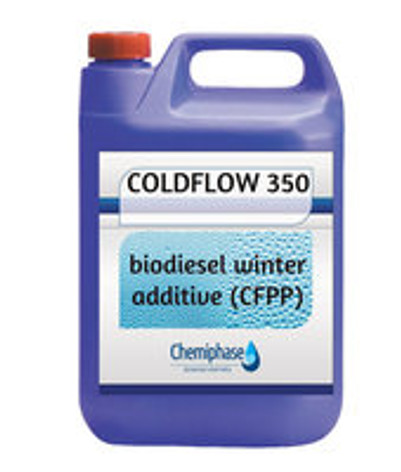Biodiesel gelling in the winter? ................ You need Coldflow 350
Posted by Ben Wiggins on 23rd Nov 2021
Are you having problems with biodiesel in winter? Is your biodiesel gelling in those cold mornings? All of these symptoms are very common in biodiesel. At Chemiphase we have the solution in our product range – Coldflow.
Coldflow 350 & 402 are specially designed biodiesel winter additives which control the point your biodiesel gells at allows you to run your hard made fuel right the way through the year without any problems.
Coldflow 350 – Biodiesel Winter Additive
Coldflow 350 will prevent biodiesel blends from clouding and gelling at low temperatures. Coldflow 350 is a cold flow improver designed for biodiesel’s produced from blends of Rapeseed Methyl Esters (RME), Used Cooking Oils (UCO), Waste Virgin Oils (WVO). Coldflow 350 will provide cold weather protection and improve performance of storage and stability in biodiesels produced from blends of all ester based fuels.
Coldflow 350 is highly effective on Biodiesel’s made from :
- Vegetable Oil waste/Virgin
- Rapeseed Oil waste/Virgin
- Soybean Oil waste/Virgin
- Used Cooking Oils,
- Mustard Seed Oil waste/Virgin
- Algae Oil,
- Recycled Oil’s from restaurants, chip shops etc
Benefits :
- Coldflow 350 will significantly improve the cold weather performance of biodiesels.
- Coldflow 350 can be added 5 deg C above Biodiesel Cloud Point
- Mixing times vary depending on quality but generally a 10 minute mix with a re-circulation pump is more than sufficient. If a mixing paddle is used a 5 minute mix is sufficient.
- Coldflow 350 will prevent biodiesels made from RME, UCO, WVO blends from clouding and gelling at low temperatures to be added to fuel when temperature is above 55 deg C as product will flash off. Please note: should the biodiesel have other additives that are not supplied by Chemiphase Ltd then there may be further alterations to the predicted pour point.
Typical Dilution Rate’s of 3000ppm – 5000ppm (3 Litres – 5 Litres per 1000 Litres of Biodiesel) Coldflow 350 must be added 5°C above Cloud Point of Biodiesel.
How it Works:
Biodiesel will cloud like petroleum diesel fuel when the weather gets cold. Initially we see little crystals of wax forming and these crystals will begin to clog fuel filters. When it becomes colder still, the biodiesel will form into a gel that will eventually set solid. Depending on the type of oils used to make your biodiesel i.e. virgin vegetable seed oils have a lower pour-point (or CFPP — Cold-Filter Plugging Point) than used cooking oil (UCO, WVO) mixtures. This is due to the level of saturation, or number of hydrogen atoms present. This is determined by the Iodine value. Generally the higher the Iodine value of the oil, the biodiesel esters produced will take on a lower pour point. To avoid this problem we suggest your produced biodiesel is treated with Coldflow 350 additive during all winter and spring months. Coldflow 350 has been specifically designed to modify the wax crystals, lowering the pour point of your bio-diesel fuel.
Coldflow 350 or Coldflow 402 for my biodiesel ?
Generally if your biodiesel begins to cloud and gel at or above 10 deg C then you need Coldflow 402. If your biodiesel begins to cloud and gel below 10 deg C you need Coldflow 350
Coldflow 350 is generally dosed at 3000ppm / 3 Litres per 1000 Litres of biodiesel. As you can see below if you bought a 20 Litre container of Coldflow 350 it would only add a 1.7 pence to the manufacturing cost of your biodiesel. This enhancement would then enable biodiesel to perform at the lowest of UK temperatures, -17 deg C.

